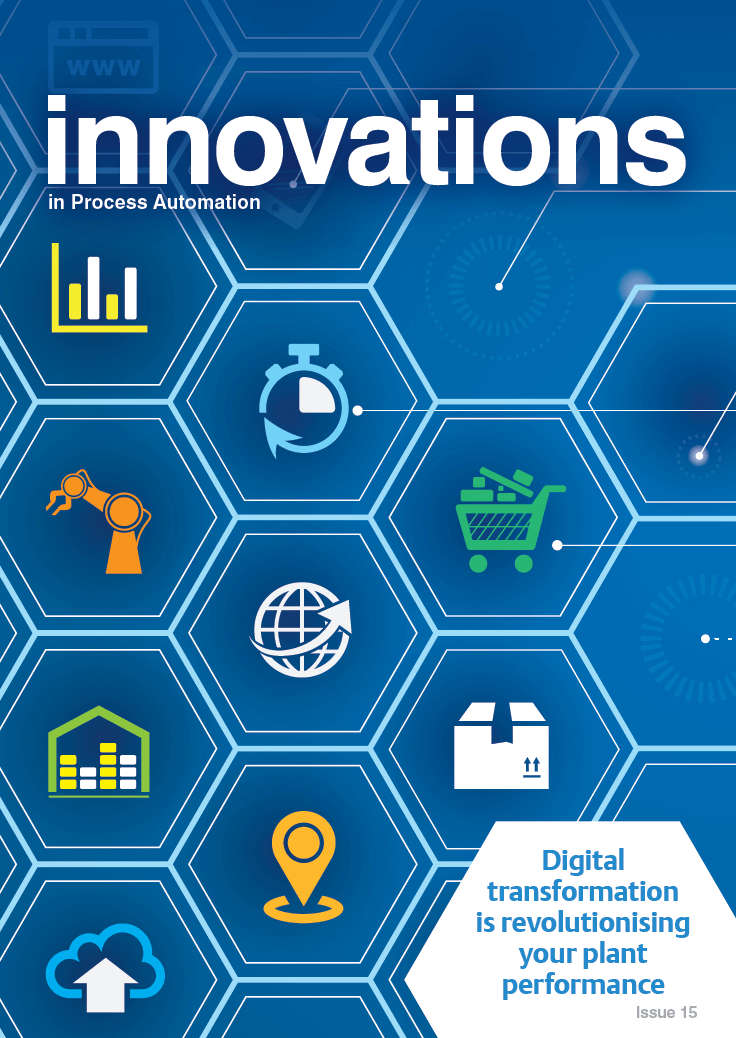We see it in our daily lives as companies undertake digital transformation initiatives, either for competitive advantage or survival. Many industries, including music, film, transportation, and lodging are all going through this.
 Even within our world of manufacturing, market forces are driving the need for digital transformation to drive step-change improvements in safety, reliability, efficiency & emissions, and production.
Even within our world of manufacturing, market forces are driving the need for digital transformation to drive step-change improvements in safety, reliability, efficiency & emissions, and production.
The latest edition of Emerson’s Innovations in Process Automation magazine, Digital transformation is revolutionising your plant performance, highlights some of the ways these transformational initiatives are improving business performance. Articles include:
- FIS digitising its work processes to improve production and efficiency
- IIoT technologies and services initiate era of digital transformation
- Mapping out a digital route to Top Quartile performance – by Chris Hamlin
- Take predictive maintenance to a higher level with digital solutions – by Jean-Luc Goutagny
- Digital twin technology plays vital role in optimizing plant operations – by Ronnie Bains
- Personnel location system safeguards workers in hazardous environments – by Moazzam Shamsi
- New digital approach to turnarounds reduces costs and shortens schedules – by Johan Claassen
I’ll highlight the second article, an interview with Emerson Automation Solutions president for Europe, Roel Van Doren and invite you to read the rest—which is also available in French, German, Italian and Spanish.
When asked about what Industrial Internet of Things (IIoT) technologies and services involve, Roel explains:
IIoT technologies use network-enabled intelligent sensing devices and applications to collect, analyse and act upon huge amounts of plant data. Companies in the process and manufacturing industries have already been using connected sensors to feed data into computers to control their processes for many years. The IIoT uses connectivity as a means to extend this methodology, so that real-time data can be accessed and interpreted by experts anywhere in the world. They can then provide actionable insights that can lead to significant improvements in core areas such as energy consumption and equipment reliability.
When asked to describe what digital transformation means, he notes:
Digital transformation involves combining IIoT technologies with workflow, process and cultural changes to facilitate operational improvements. This requires a clear strategy, based on a company’s key business objectives. If that is in place, digital transformation can be a game-changer in terms of exploiting technology and expertise better than ever before, to deliver performance optimisation.
Roel shares areas where digital transformation can bring value:
Ultimately, digital transformation helps companies increase plant safety, reliability and profitability, driving them towards Top Quartile performance. It can eliminate repetitive tasks and streamline standard operations, allowing workers to focus on exceptions to normal operations, solving problems, and identifying opportunities for value creation. To tap the full power of digital technologies, it is essential to securely put them in the hands of workers, wherever and whenever they need them. This idea is key to enabling collaborative workflows. For example, if control room operators need to ask a process engineer how to solve a problem or improve performance, they can now do so from halfway around the world, with secure mobile applications that provide process data and analysis to both parties in real time.
Read the article for Roel’s additional views and the other articles for perspectives from other European Emerson experts. You can also meet many of them at an Emerson Exchange conference, either September 23-27, 2019 in Nashville, Tennessee or March 18-20, 2020 in Milan, Italy. You can also connect and interact with digital transformation experts in the IIoT & Digital Transformation group in the Emerson Exchange 365 community.





